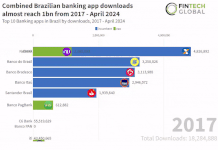Challenger banks’ big issue currently is they’re not actually banks and lack the experience to thrive, according to Alior Bank managing director Bruno Ferreira in a research interview with FinTech Global.
The challenger bank industry has seen a three-year rise in funding levels, with investment volume reaching record levels last year, according to data by FinTech Global. There was a total of $2.8bn deployed to the sector globally in 2017, around 2.4-times more capital than that which was invested during 2016.
However, one of the challenges that Alior Bank’s Bruno Ferreira sees them having, is the fact that they are not really banks. The problem is they do not have the experience, or in some cases a banking licence, and it means it in their current stage, it is hard for them to operate. A lack of experience also hinders their ability to keep up with regulations as banks have had to face constant changes for a long time.
Ferreira said, “You have companies that are now looking at getting banking licenses, but they are not banks yet. Even if some have got a banking license or on the verge of it, they don’t have the history of being a bank. They are not used to complying to regulation as right now or they are not bound by some of them at least. Also, their solutions, although very innovative and able, they are not as secure as ours as we are a bank.”
Keeping up with regulations is not new to traditional banks, it is part of their daily operations, and the implementation of regulations such as PSD2 and GDPR can put a lot of strain on institutions, especially newly established ones which lack experience. Alior Bank sees itself as both a traditional bank but also as a FinTech, which is leading innovation in technology for banking services. It is currently one of the 10 biggest banks in Poland and has the fourth biggest distribution network in the country. “We bring together both worlds, the world of safe banking and the world of innovation,” he added.
By already being a fully compliant bank, it means there is already the experience to cope with the current wave of regulations, but also means its mobile banking services are supported through bank-level security.
One of the other issues that Ferreira sees challenger banks are being presented with is the high level of competition. These FinTechs are not only going up against traditional banking providers, but also non-banking companies. Alior is combatting this through the launch of a pan-European challenger bank, which is being formed in a partnership with solarisbank, MasterCard and Raisin. The launch of this new service will help Alior to keep up with the evolution of the banking industry by being open and connecting with other service providers. The new pan-European challenger bank is expected to launch by the end of the year.
A new challenger approaches
This platform will be built through a combination of services supplied by each company. Alior will provide the multicurrency accounts with international transfers and deposits, while solarisBank will add the banking infrastructure through its technological, compliance and regulatory framework. Raisin will use its network of partner banks to supply various savings and investment possibilities to the new company and MasterCard’s Benefit Optimization programme will support other ‘value-added’ services to customers. While the solution will be available across Europe its initial focus will be on the German market.
Since 2014, Europe has seen more than half of the total deal activity in the challenger bank space, according to data by FinTech Global. Of the total 128 investments to have been made in challenger banks around the world, 57 per cent of them (73 deals) have been based in Europe, showing the region’s appetite for the services. The second biggest market was North America, making up 21.9 per cent of the deals, around 28 investments. An extension to the high-level of interest into challenger banks, especially in Europe, has been some large investments. UK-based Atom Bank raised a $207.1m investment at the start of 2018, and German challenger N26 secured $160m in its Series C around the same time.
Ferreira said, “The market is becoming more regulated and the regulator is pushing towards more openness. The client is also demanding a solution that is more mobile that doesn’t have borders and not bound to a specific location. That is becoming more of a customer trend, people want to be mobile whether they are, independent of what country because they are traveling more, and they demand the bank goes with them. We also see a lot of innovation that is out there, that you should not try to imitate, you should just try to compile that and offer it to our clients.”
This evolution of the banking market was one of the driving forces behind the creation of Alior’s new joint-venture challenger bank. Its offer is being created with the European open banking initiative at its core. Its infrastructure is being designed around flexibility and the ability to leverage a customer’s need or a change in regulation, to ensure it is always best-adapted to the current market. “Seeing what is being offered in the market, we felt that being a bank and being able to gather all those innovations that are being developed and bring that to the client is something that is instinctive,” he added.
Over time, he believes that other banks will look to launch similar initiatives and open up more, but the ones that choose not to will face a tough challenge. The market is evolving, and the brand of a bank is no longer as important to the consumer, instead, it is the flexibility of the solution and how mobile it is.
However, while there will be other banks trying to replicate the pan-European bank, Alior believes it has the advantage of being first, as well as being a FinTech bank itself that is not held back by legacy infrastructure. “Other players will probably follow, we see that we have an advantage because we are new to the market. What that mean is that we have an IT platform which is flexible and new, and don’t have legacy IT which is slowing us down as other players have.”
Adaptability is an essential part of the future of banking, and Alior understands this. While the pan-European bank is made up of Alior, solarisbank, MasterCard and Raisin, once the service has launched it will look to add more tools to its utility belt. The consumers are behind the driving seat for the bank, and they will direct what way the bank goes, in terms of the services it provides. Once clients make it clear what they are looking for, the challenger bank will look to connect with other FinTechs that can cater to their needs.
“We don’t know how the banking market is going to be in five or 10 years. We see a lot of technology and customer trends that are shaping the market, but nobody has the crystal ball. But, we do know what needs to be done to survive, and that’s being adaptable and flexible. That’s what we want to accomplish by connecting with other companies.”
While Alior sees mobile solutions as the main evolution point for the challenger bank space, it also sees services beginning to broaden. At the moment a lot of the companies have offered mono-solution applications. In the coming years, these businesses will look to offer other tools that will complement their existing service, such as saving products or credit lines.
Copyright © 2018 FinTech Global











